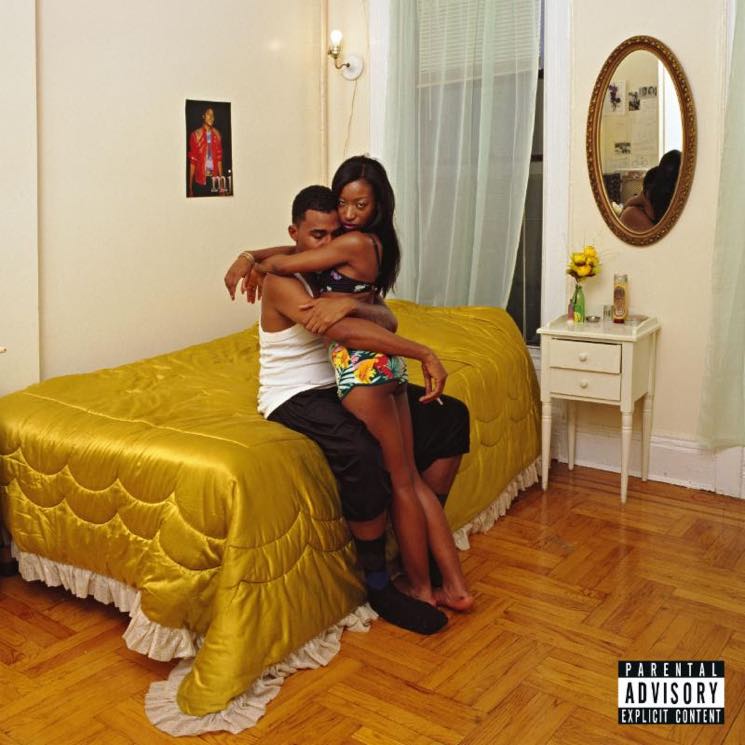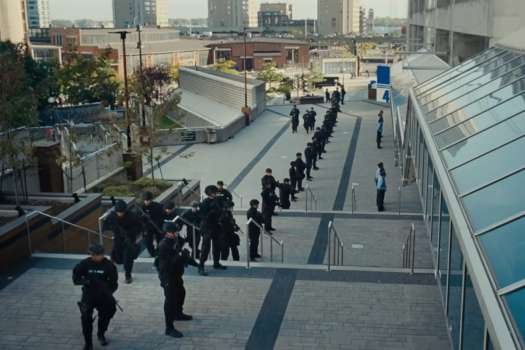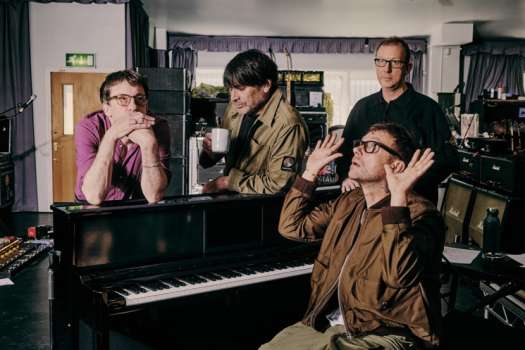While there are new cover stars for Exclaim!'s September's issue, it feels like the dense, sprawling Freetown Sound — the recent opus from summer issue cover star Blood Orange — is still sinking in. Its dense, lush, pastiche sound and poignant lyrical themes have resonated throughout the summer, and with his "Welcome to Freetown" tour about to kick off, including a Toronto set in September, we've mined our in-depth interview with Blood Orange mastermind Dev Hynes for illuminating nuggets that didn't quite fit into the pages of our Summer Issue.
Over the phone from New York, Hynes speaks below about some of the influences and inspirations that led to his incredible third album. Here are five things you may not know about Blood Orange's Freetown Sound.
Five Things You May Not Know About Blood Orange's Freetown Sound:
1. His genre-spanning, eccentric sound was influenced by the wealth of music he heard as a child, including… metal?
My dad listened to classical a lot, and my mom was more a fan of pop like Sade, Simply Red, Annie Lennox. My sister was a big Nirvana and Blur fan, and my brother was into rap. So there was all that, and then I got into metal. That's how I learned guitar; I learnt guitar through playing in metal bands.
2. Hynes has been getting back in touch with his childhood loves lately, rekindling his affection for the things he was embarrassed by as a teen.
I think maybe as you get older, you start to… It's not that things haven't made you happy before, but you start to really gravitate towards a sense of honesty in your happiness — at least for me, anyway. What I've been finding is that I'm going back to a lot of things that gave me pleasure, and I'm finding that they were really important now, whether that's classical performances or dancing more, all these things that, when I was younger, I just found instantly pleasing. That's coming back full swing for me. Jazz, for example, has come back so strong in my life.
3. That's brought back painful memories, as well. Being bullied, for example, has influenced "everything I've ever done," Hynes says, including Freetown Sound.
The first Lightspeed [Champion] album was very intensely about that. The first Lightspeed album is similar, I think, to this one. That was about a lot of race stuff and displacement in regard to living in London, but really every record after that was about bullying and my childhood. If anything, I think this one is more looking into questions of why. As in, what led to those people — it was mainly black people that were bullying me, rather than people who were racist.
It was an especially confusing thing, growing up. The place in particular I went to school, the biggest population there is Islamic and Sikh, and yet the BNP [British National Party] was always in power. There was this awful thing where I'd be walking home and if I saw the Union Jack outside of a pub, I'd cross the street. It's insane to grow up in a place and see the flag of that country and think, 'Oh shit, I have to cross the street.' But at the same time, all the black kids growing up were bullying me.
So nowadays, I'm looking into what I've always thought were kids with non-education about black people, in England. I just think that there was not really a sense of unity when I was growing up in East London. I think it's changed now, but there was a sense of not really knowing what everyone'd gone through that led to this, like, idea of bullying each other.
4. Freetown Sound isn't just about Hynes; it's about including a multitude of voices that speak to the importance of community and visibility.
I think it's important. All I'm ever usually trying to do is create a room that is like a world for people that they're able to be free in — to be themselves, to talk in. I just felt like that was such an important part. That song, ["By Ourselves,"] that's what I was trying to say. When I was writing that song, I knew it would be track one. For a long time, it had that arrangement at the end.
Initially, it had audio recorded I had made of Hilton Als talking about Diane Arbus, about her form of expression, and being herself, living through the portraits she was making in New York. It was really nice, I liked it, but there was a disconnect. [With poet Ashlee Haze, who performs "For Colored Girls (The Missy Elliott Poem)" on the track,] I had made a tape of her poems to listen to and stuff. I'm trying to express it in a certain way in the song, and when she comes in, it just hits the nail on the head.
That's why I use Marlon Riggs on the album too, the "Black is… Black ain't" bit, because he's someone who wrote a lot of really great books about black masculinity and what it means. That's my nod to that.
5. Voices are an instrument, not a focus, so sometimes collaborators — and there are plenty on Freetown Sound, including Nelly Furtado, Empress Of, Bea1991, Carly Rae Jepsen and more — are a better vocal fit for a song than he is.
It's all pretty natural. I view voices as the same as other instruments in the music. Say I'm writing a song, and I'm playing bass and I think "There's a different style of bass I want." I'll just get somebody else to do it. I don't really have any ego in regard to that. It's the same with voice, too. I just like layers of voices.
I also get bored! The last thing I ever want to listen to in the world is an album of just me singing. That is a nightmare to me. It's not as full a statement as "I don't like my voice," but I'm very aware of what it can and can't do. I'm more than happy to use other people's voices to take the music to a given place.
I don't get people in bands, I've never understood those limits, or rules. It's very, just, "Oh, this part would sound good with this singer," or "In this music, I wonder what this person I'm inspired by would do over it." It's really just whatever works. Whatever takes it to the best place for me.
Read more about Hynes' journey to Freetown Sound here.
Over the phone from New York, Hynes speaks below about some of the influences and inspirations that led to his incredible third album. Here are five things you may not know about Blood Orange's Freetown Sound.
Five Things You May Not Know About Blood Orange's Freetown Sound:
1. His genre-spanning, eccentric sound was influenced by the wealth of music he heard as a child, including… metal?
My dad listened to classical a lot, and my mom was more a fan of pop like Sade, Simply Red, Annie Lennox. My sister was a big Nirvana and Blur fan, and my brother was into rap. So there was all that, and then I got into metal. That's how I learned guitar; I learnt guitar through playing in metal bands.
2. Hynes has been getting back in touch with his childhood loves lately, rekindling his affection for the things he was embarrassed by as a teen.
I think maybe as you get older, you start to… It's not that things haven't made you happy before, but you start to really gravitate towards a sense of honesty in your happiness — at least for me, anyway. What I've been finding is that I'm going back to a lot of things that gave me pleasure, and I'm finding that they were really important now, whether that's classical performances or dancing more, all these things that, when I was younger, I just found instantly pleasing. That's coming back full swing for me. Jazz, for example, has come back so strong in my life.
3. That's brought back painful memories, as well. Being bullied, for example, has influenced "everything I've ever done," Hynes says, including Freetown Sound.
The first Lightspeed [Champion] album was very intensely about that. The first Lightspeed album is similar, I think, to this one. That was about a lot of race stuff and displacement in regard to living in London, but really every record after that was about bullying and my childhood. If anything, I think this one is more looking into questions of why. As in, what led to those people — it was mainly black people that were bullying me, rather than people who were racist.
It was an especially confusing thing, growing up. The place in particular I went to school, the biggest population there is Islamic and Sikh, and yet the BNP [British National Party] was always in power. There was this awful thing where I'd be walking home and if I saw the Union Jack outside of a pub, I'd cross the street. It's insane to grow up in a place and see the flag of that country and think, 'Oh shit, I have to cross the street.' But at the same time, all the black kids growing up were bullying me.
So nowadays, I'm looking into what I've always thought were kids with non-education about black people, in England. I just think that there was not really a sense of unity when I was growing up in East London. I think it's changed now, but there was a sense of not really knowing what everyone'd gone through that led to this, like, idea of bullying each other.
4. Freetown Sound isn't just about Hynes; it's about including a multitude of voices that speak to the importance of community and visibility.
I think it's important. All I'm ever usually trying to do is create a room that is like a world for people that they're able to be free in — to be themselves, to talk in. I just felt like that was such an important part. That song, ["By Ourselves,"] that's what I was trying to say. When I was writing that song, I knew it would be track one. For a long time, it had that arrangement at the end.
Initially, it had audio recorded I had made of Hilton Als talking about Diane Arbus, about her form of expression, and being herself, living through the portraits she was making in New York. It was really nice, I liked it, but there was a disconnect. [With poet Ashlee Haze, who performs "For Colored Girls (The Missy Elliott Poem)" on the track,] I had made a tape of her poems to listen to and stuff. I'm trying to express it in a certain way in the song, and when she comes in, it just hits the nail on the head.
That's why I use Marlon Riggs on the album too, the "Black is… Black ain't" bit, because he's someone who wrote a lot of really great books about black masculinity and what it means. That's my nod to that.
5. Voices are an instrument, not a focus, so sometimes collaborators — and there are plenty on Freetown Sound, including Nelly Furtado, Empress Of, Bea1991, Carly Rae Jepsen and more — are a better vocal fit for a song than he is.
It's all pretty natural. I view voices as the same as other instruments in the music. Say I'm writing a song, and I'm playing bass and I think "There's a different style of bass I want." I'll just get somebody else to do it. I don't really have any ego in regard to that. It's the same with voice, too. I just like layers of voices.
I also get bored! The last thing I ever want to listen to in the world is an album of just me singing. That is a nightmare to me. It's not as full a statement as "I don't like my voice," but I'm very aware of what it can and can't do. I'm more than happy to use other people's voices to take the music to a given place.
I don't get people in bands, I've never understood those limits, or rules. It's very, just, "Oh, this part would sound good with this singer," or "In this music, I wonder what this person I'm inspired by would do over it." It's really just whatever works. Whatever takes it to the best place for me.
Read more about Hynes' journey to Freetown Sound here.




